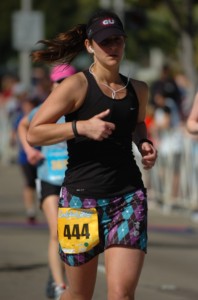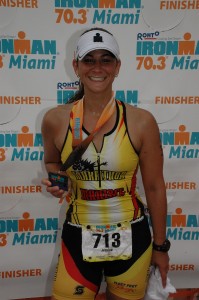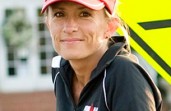By Alix Shutello
“I am driving every day to be the best I can be in my home life, professional life and endurance life. that takes hard work, so when the times get rough, you got to look at the big picture and ask, ‘Is what I am doing today going to get me closer to that goal?’ If yes, then do it with purpose and compassion. If not, then ditch it by the wayside.”
Jessica Deree grew up in Massachusetts as a competitive swimmer. When she started college at the University of Miami, she focused primarily on the premed program; and once she got into medical school and started her residency, she stopped all forms of exercise due to the demands of school and studying. As a result, she gained about 30 pounds.
“I was extremely unhappy about the weight gain,” Deree said. “I had met the love of my life and started my dream job as a general surgeon, but this was the one piece that was missing.”
Now a resident of San Diego, Deree took up running on the advice of a coworker who ran marathons. When she started, she was able to run only a 1/4 of a mile at a time and then walked to complete 2 miles.
“I remember feeling defeated when anyone would pass me, but I kept at it and would not quit,” she said.
The first time she ran a mile without stopping, Deree recounted, was akin to winning the Olympics. She signed up for a 5k a couple months down the road to keep her motivated. She ran her first 5k in 31 minutes and was not only proud, but also had a lot of fun.
“I got the racing fever shortly after, and signed up for my first half-marathon in August of 2010.” Deree ran the ET marathon in Rachel, Nev., at midnight, crossing the line in 2:36. She began to train for a full marathon and finished the Surf City Marathon in February 2011 in 4:50. Needless to say, the extra weight she was carrying was gone; she was now an official runner with a lot of experience. Since then, Deree has competed in over 30 half-marathons and 10-12 marathons. Her marathon PR is now 3:53, and her half PR is 1:47.
Deree had started swimming again in the summer of 2010, and wondered if she could do a triathlon. Given her phobia of cycling, she was leery; plus, she hadn’t ridden a bike in over 30 years. Not answering to her fears, Deree competed in the inaugural Tri-rock San Diego that same year. She bought a bike only 3 weeks before the race.
“I had to learn how to stay upright and turn – but I did it, and absolutely loved it,” Deree said. Despite having fallen plenty of times, Deree fell in love with all three sports. S In 2011, she completed her first Ironman, finishing at 70.3. “I was almost dead last, but it didn’t matter; I had done something that I never in my wildest dreams thought possible,” she said.
Next on her list was the ultra triathlon. Deree completed her first 140.6-miler in Florida in November 2012. She trained herself and finished in 12:43. Now as she runs her many road races, she has set her sights on Ironman races in Texas and Arizona this year.
TRAINING
Deree had trained on her own, and used the Training Peaks program for 14 weeks to train for the Ironman Florida on the “I don’t care what time I finish, just get me to the line program.”
Post Ironman Florida, Deree was more serious. She trains about 15-20 hours a week and now has a coach, Sergio Borges, who lives in San Diego and who coaches triathletes all around the world. Deree noted that in San Diego, you can “have your pick of the litter with coaches,” but said she chose Borges for two reasons. “First, his main philosophy is that your home life and career come first, and if this is not in balance, you will never succeed as an endurance athlete.” Second, he takes the time to work with Deree on bike safety and technical skills, which gave her great confidence.
“I have used the endurance nutrition company Fuel Factor, based in San Diego, for my fueling strategies for race day. I like them because they will build a guide for you based on what you know works for you during a race,”
Her training includes two bricks a week, which are the traditional long runs and bike sessions, and big gear power sessions to make her stronger. Deree’s bike is a Felt B16. She rides the biggest gear on the trainer, with a rubber band around the break to give her super-huge resistance. In the water, Deree swims with paddles (TYR) to work on strength, with swim bands around her legs. She runs a lot of hills and does tempo work, and said that all of her runs have purpose. For additional strengthening, Deree does two core and strength training sessions a week.
“I train alone, because my work schedule as a surgeon is so erratic that I can’t make it to group activities a lot of times. I work about 60 hours a week, sometimes more. Some- times I work 30 hours in a row – and that then counts as my workout rest day (go figure). I occasionally miss a few training days due to work, but my coach reassures me that this will not impact my fitness on the long term. If I miss a workout, I just skip it—I don’t try to make it up later in the week,” Deree commented.
FAMILY LIFE
Deree has been married for 5 years; her husband is also an MD. “Sometimes it feels like we may not see each other for days; so if I see him get that look of disappointment on his face when I am putting my tri kit on to get in a workout late in the day, there are times when I say, ‘I am not a pro, I want to spend time with my husband’ —and that’s what I do.”
SPONSORS
Deree is part of the Gu Pro Deal Program, which has a lot of inexpensive products. She prefers Gu gels, and alternates those with caffeine and those without. On the bike, Deree often eats Bonk Breaker bars and drinks Gu Roctane grape beverage.
“I am not one of those people who can throw down a piece of pizza on the bike, so everything I eat has to be high in calorie and electrolyte value.” On the first half of the run of tri races, Deree drinks an electrolytes beverage (usually Ironman Perform). On the second half, she drinks cola coupled with a salt tab every hour.
“I think training has a lot to do with it. If you don’t push yourself through those barriers in your day-to-day training, how can you expect yourself to do it on race day? I finish every run from my home with a sprint down the street and pretend my driveway is the finish line.”
MENTAL CONDITIONING
“I think training has a lot to do with it. If you don’t push yourself through those barriers in your day-to-day training, how can you expect yourself to do it on race day? I finish every run from my home with a sprint down the street and pretend my driveway is the finish line. I picture my family and all the supporters cheering me on. I know it sounds silly, but it works. I am mainly driven by the desire to see how good I can be at this sport. I also think about what a privilege it is to be able to race, and to have the support system and capacity to be able to do it.”
Deree admitted that being a double-income, no-kid family has its advantages. “I spend more than the average bear,” she said. “Triathlon is an expensive sport, and I like to do destination marathons. I’m working on completing a marathon in each state.” Therefore, Deree invests between $30-40K a year.
When it comes to injury and fatigue, Deree explained she had a lot of injuries when she started in this sport—basically because she was trying to do too much, too fast. Her biggest complains were IT-band issues and shin splints. To help her heal, she has used Trigger Point therapy myofascial release system. “The process takes about 15 minutes a day, but it takes all the pain and soreness away almost instantly. I find it much more effective than sticks or foam rollers, and easier to travel with.”
TRAINING TIPS
1. Practice your nutrition every day. You never want to be the one bonking or puking on the roadside; it negates all of your other training.
2. Every workout should have intention and purpose (strength vs. speed vs. endurance). Try to stagger similar types of workouts throughout the week.
3. Take a minute and be proud of every workout you complete. I often give my husband a full-out jumping high-five when I get home from a workout; he laughs every time. The journey to race day is such a big part of this sport, you have to appreciate it.
4. Always, always make time for family. Being a spectator on Ironman day is probably as tough as being on the course, especially if you have to wrangle the children (for us a dog) during the majority of the day just to watch mommy or daddy run by once or twice. Make sure you don’t put them on the back burner. Missing one workout to spend time with them will not kill you. (Missing two, bad!)
5. Training with a group will push you, but I think training alone is just as important. You need to go through some of that painful training alone, so when the chips are down on race day, you can draw on those experiences and give it all you’ve got.
6. Just one more tip: HAVE FUN!! I do, every single race, whether it’s my best or my worst. I wouldn’t want to live my life any other way.












I once worked with Jessica Deree and would listen as she talked about her next marathon or her last run time,Most of time I listened and thought how on earth does she keep that drive while working?She is very much an inspiration and great motivator!How wonderful to read this article too!!!I look forward to reading more about her ventures across the nation.Nice Job Deree!!!